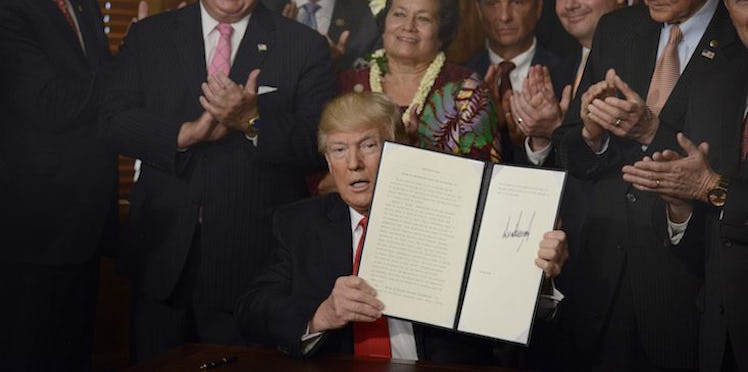
Why Do We Care So Much About The First 100 Days Of A Presidency?
If you've paid attention to the news cycle lately, you've probably noticed there's been a lot of chatter about President Donald Trump's first 100 days in office.
There are a number of reasons why this marker, which for Trump occurs on Saturday, is so widely discussed in relation to American presidents.
It has a lot to do with the modern history of the US, dating back to FDR.
There's also the fact we are naturally inclined to view 100 as a significant number or benchmark.
On top of this, when it comes to Trump, the topic of his first 100 days is being hammered to death due to statements from both him and his administration.
Not to mention, he hasn't accomplished very much and is historically unpopular.
During the 2016 presidential election, Trump made a big deal about what he would do in his first 100 days as president, but, as it has been with many other issues, he's walked back on that.
During a speech in Gettysburg, Pennsylvania in October 2016, Trump outlined his 100-day action plan, which his campaign described as "game-changing."
Trump made 28 promises to the American people and said they were "a contract between Donald J. Trump and the American voter."
Probably due to the fact he hasn't exactly lived up to his 100-day "contract" with voters, Trump recently referred to the 100-day mark as a "ridiculous standard."
Meanwhile, even though the president apparently thinks talking about his first 100 days is "ridiculous," the White House released a list of his purported accomplishments in this time frame.
The reason we talk about the first 100 days, in general, has to do with President Franklin D. Roosevelt.
The first 100 days of a presidency is a completely unofficial deadline for achievement.
But since FDR, it's been a period in which US presidents set the tone for their next four years in office.
In 1933, FDR was inaugurated amid the worst economic calamity this country has ever seen -- the Great Depression.
This is when he famously stated, "The only thing we have to fear is fear itself."
At the time, poverty was ubiquitous, roughly 15 million people were unemployed (over 20 percent of the US population at the time), people waited in bread lines, homelessness was rampant and shanty towns popped up nationwide (including in Central Park).
Long story short, FDR definitely had his work cut out for him when he came into office (nothing like the situation Trump inherited).
But he rose to the occasion and worked with a cooperative Democratic majority in Congress to lay the foundations for the New Deal, a group of government programs that, along with World War II, brought America out of the Great Depression.
Roughly four months after his inauguration, Roosevelt delivered his third radio speech as president, and this changed everything.
Over the course of his presidency, Roosevelt would deliver 30 of these "fireside chats."
In this speech, FDR offered a 3,000-word report on what he'd accomplished in his first 100 days.
He said,
I think that we all wanted the opportunity of a little quiet thought to examine and assimilate in a mental picture the crowding events of the hundred days which had been devoted to the starting of the wheels of the New Deal... We have built a granite foundation in a period of confusion.
Since this speech, US presidents have attempted to emulate FDR in their first 100 days.
But not all modern presidents have welcomed such a deadline.
Unlike Trump, President John F. Kennedy was more cautious in promising massive or specific accomplishments in his first 100 days.
During his inaugural address, after outlining his hopes for the country, JFK said,
All this will not be finished in the first one hundred days. Nor will it be finished in the first one thousand days, nor in the life of this Administration, nor even perhaps in our lifetime on this planet. But let us begin.
History shows JFK's reluctance to attach himself to the 100-day benchmark was pragmatic.
When rating a president's performance, historians pay attention to far more than his or her first 100 days.
As Fredrik Logevall, a presidential historian and an international affairs professor at Harvard University, told The Washington Post, history shows us 100 days is an "arbitrary benchmark."
As Logevall explained, it hasn't "correlated very much with subsequent success or failure," and moreover, "whether an administration has success or not really depends on the four years, or eight years if you have two terms."
So in a sense Trump was correct to say it's a "ridiculous standard," but he's still a hypocrite.
If Trump had never attached promises to his first 100 days -- and if the White House wasn't making such an effort to emphasize what he's accomplished -- it would arguably be fair for him to say this topic is "ridiculous" or "artificial," as he also described it in a recent interview with AP.
In the end, as Logevall highlighted, what truly matters is what a president is able to accomplish over the course of his or her entire tenure.
With that said, Trump should probably not make promises attached to a deadline and then dismiss it all as "ridiculous" when he fails to deliver.
Citations: Transcript of AP interview with Trump (AP), In Gettysburg, Trump outlines agenda for first 100 days (Yahoo News)